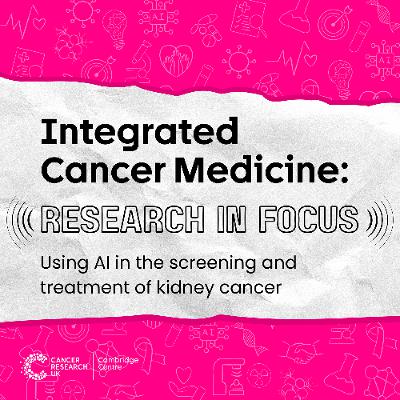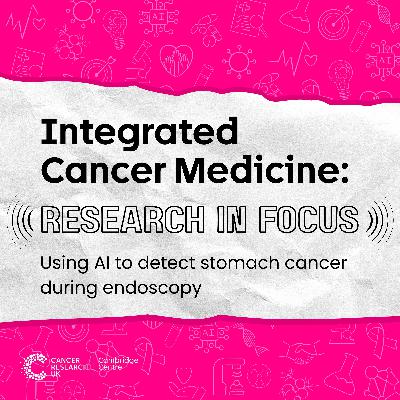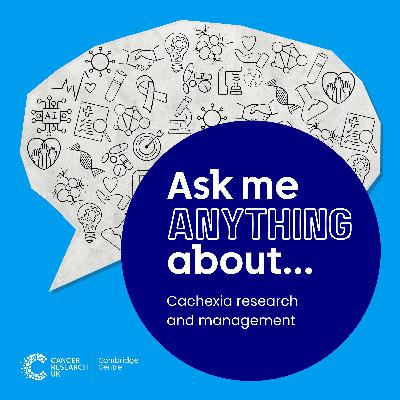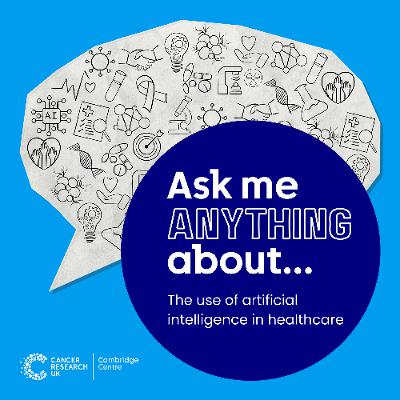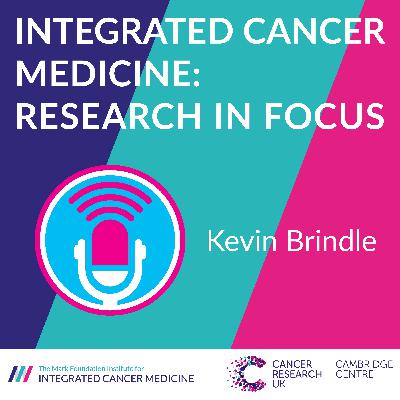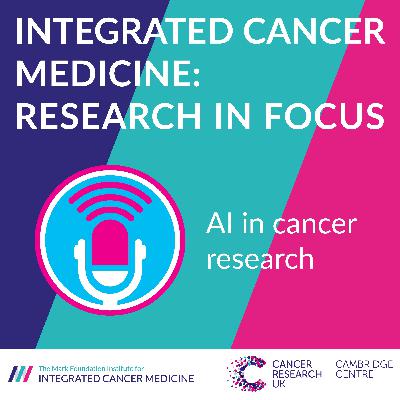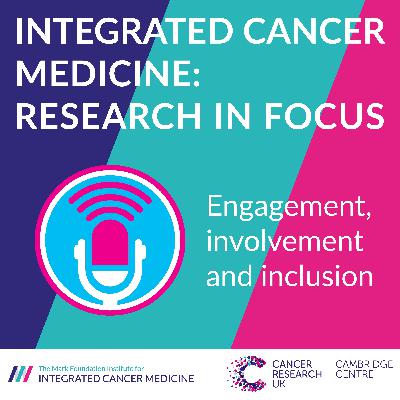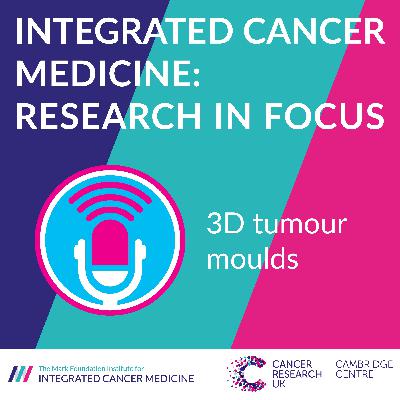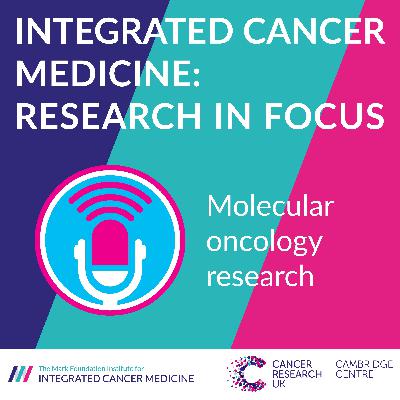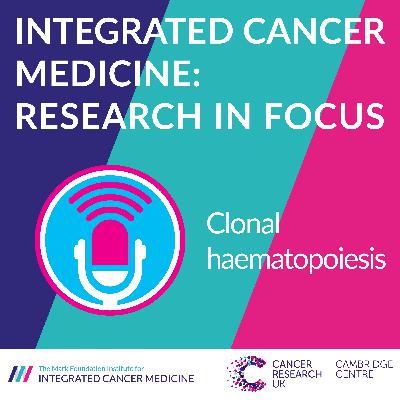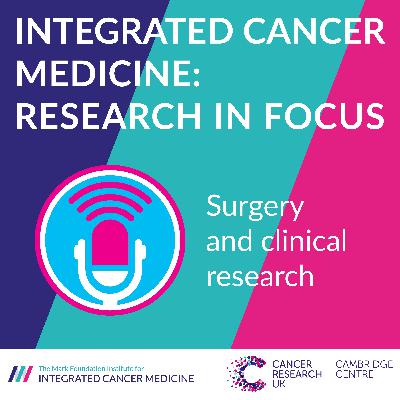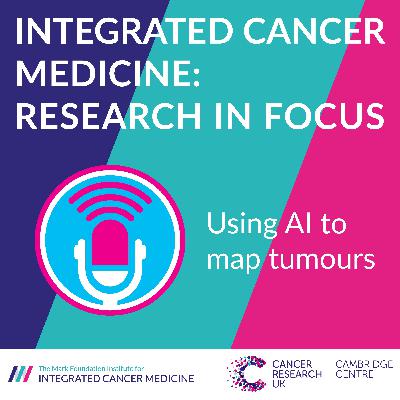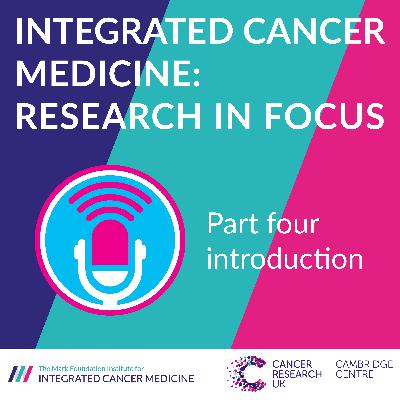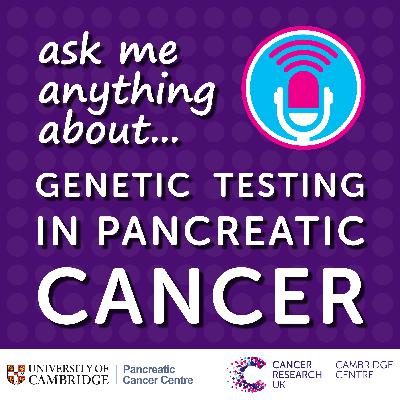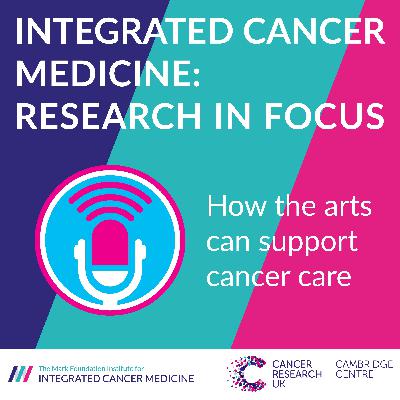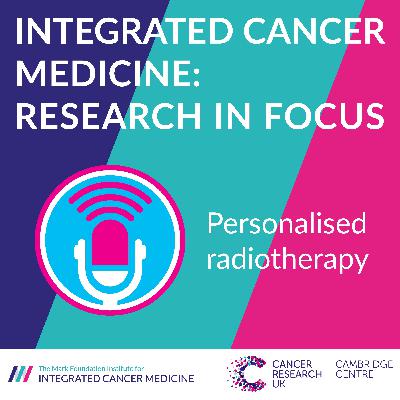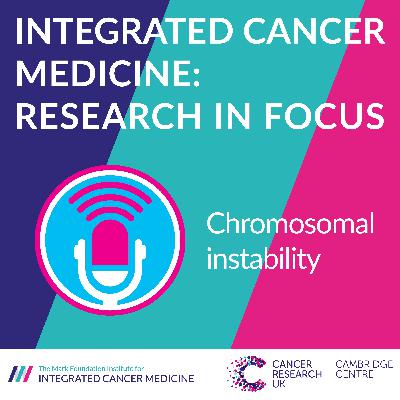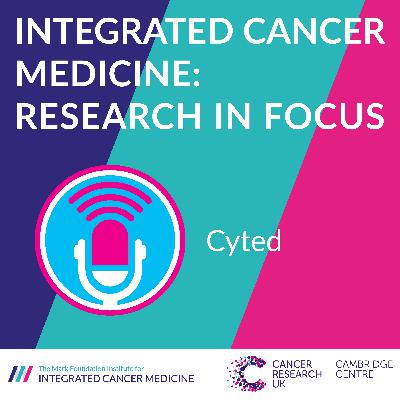Discover The Cancer Research UK Cambridge Centre Podcast
The Cancer Research UK Cambridge Centre Podcast

The Cancer Research UK Cambridge Centre Podcast
Author: Cancer Research UK Cambridge Centre
Subscribed: 25Played: 209Subscribe
Share
© All rights reserved
Description
The Cancer Research UK Cambridge Centre unites over 1,000 world-leading biologists, chemists, physicists, engineers, mathematicians, computer scientists, clinicians, nurses and allied healthcare professionals from across Cambridge, UK to tackle cancer from every angle.
Our mission is to end death and disease caused by cancer through research, treatment and education. We are detecting cancer at its earliest stage and are developing personalised treatments for every patient through facilitating new collaborations and driving the translation of new scientific discoveries into clinical applications to improve patient care. By working together across a range of different disciplines, our members are breaking down the barriers between the laboratory and the clinic, enabling patients to benefit from the latest innovations in cancer science.
Our mission is to end death and disease caused by cancer through research, treatment and education. We are detecting cancer at its earliest stage and are developing personalised treatments for every patient through facilitating new collaborations and driving the translation of new scientific discoveries into clinical applications to improve patient care. By working together across a range of different disciplines, our members are breaking down the barriers between the laboratory and the clinic, enabling patients to benefit from the latest innovations in cancer science.
62 Episodes
Reverse
Have you ever wondered how artificial intelligence (AI) is used in research in a healthcare setting? Rebecca Wray and Bill McGough, two PhD students at the University of Cambridge, both use AI in different ways in their research into the screening and treatment of kidney cancer.
Rebecca is an MRes PhD student investigating the response and resistance to therapy in patients with kidney cancer. She uses AI to find tumour features at multiple scales. For his PhD, Bill is developing AI models that will sift through the mounds of imaging data produced during the Yorkshire Kidney Screening Trial (funded by Yorkshire Cancer Research), flagging images that show masses in the kidneys.
This interesting conversation gives insight into how researchers are using patient data safely in order for AI models to integrate all the information about a patient to help review their treatment and personalise it. The discussion also highlights how using AI in the screening setting is speeding up processes to help save clinicians' time and allowing the potential earlier detection of kidney cancer in a cost-effective manner.
How can artificial intelligence (AI) support both cancer research and healthcare more generally? Anoushka Harit (University of Cambridge) and Dr Zhongtian Sun (University of Kent) join today's episode to discuss this topic.
Anoushka talks about her research in hereditary diffuse gastric cancer (HDGC) and the development of an AI system to enable early detection of signet ring cell carcinoma (SRCC) during endoscopy. This new AI system could help to treat SRCC better or to prevent or delay drastic life-changing treatment, preserving patients' quality of life.
Zhongtian shares insights on how AI can support health applications more generally and how he tries to make it as explainable as possible. He even talks about his wish to make the AI mimic as much as possible the way a human brain works!
What do you most want to know about pancreatic cancer and cancer-associated cachexia?
In this special episode, we bring you a recording of a live 'Ask Me Anything (AMA)' event hosted by the CRUK Cambridge Centre Pancreatic Cancer Programme for World Pancreatic Cancer Day 2024.
A multidisciplinary and international panel of experts, including clinicians, researchers, nurses, dietitians and physiotherapists, answer thoughtful questions from the public about pancreatic cancer, cachexia and the latest research and care approaches. Topics range from understanding the biology of these diseases to managing symptoms and improving quality of life.
The discussion sheds light on the progress being made and the ongoing challenges in improving outcomes for people affected by these conditions.
Why does eating more not fix the severe weight loss seen in some cancer patients, and what can be done about it?
In this 'Ask Me Anything' episode, Dr Hui-Ling Ou, Programme Manager for the Pancreatic Cancer and Cancer Immunology Programmes at the CRUK Cambridge Centre, speaks with researchers from the Cancer Cachexia Action Network (CANCAN): Dr Claire Connell (University of Cambridge and Cambridge University Hospitals NHS Foundation Trust), Dr David Lewis (CRUK Scotland Institute), and Dr Tobias Janowitz (Cold Spring Harbor Laboratory).
Together, they unpack what cancer-associated cachexia is, why it's so devastating for patients, and how scientists are working to understand and reverse this syndrome. The guests share how their research, spanning metabolism, imaging, immunology, and clinical studies, is bringing fresh insights and hope to a problem that affects quality of life for so many.
This thought-provoking discussion shines a light on the collaborative efforts driving progress against one of cancer's most challenging complications.
How is artificial intelligence being used in cancer care, and what do patients think about it?
In this 'Ask Me Anything' episode, Ellie Wolmark, Programme Manager for Integrated Cancer Medicine (ICM) at the CRUK Cambridge Centre, speaks with patient representatives Lorraine, Frankie, and Ann from across our Patient and Public Involvement groups, alongside ICM researchers Professor James Brenton, Dr Ines Machado, and Dr Gabriel Funingana from the University of Cambridge.
Together, they explore how artificial intelligence (AI) is being applied in cancer research, how it could support personalised treatment, and what the future might hold. The patients share thoughtful questions and concerns about the role of AI in healthcare, while the researchers explain how it's currently being used and what challenges remain.
This lively and insightful discussion highlights just how valuable patient involvement is in shaping research that truly meets the needs of those it aims to help.
Professor Kevin Brindle joins Ellie Wolmark to discuss his life's work in imaging research as he reaches retirement. Kevin is particularly interested in metabolic imaging. His research group has developed novel magnetic resonance-based molecular imaging techniques to detect the early responses of tumours to therapy, with a view to translating these into clinical application. He talks about how he got into this topic in the first place, his amazing contributions to the field over the past four decades, and about how his techniques can be translated into the clinic to impact patient treatment.
Kevin is Emeritus Professor of Biomedical Magnetic Resonance in the Department of Biochemistry and a Senior Group Leader in the CRUK Cambridge Institute at the University of Cambridge, UK. He is also a Fellow of the Academy of Medical Sciences and of the Royal Society.
Dr Ines Machado, Dr Gabriel Funingana, Thomas Buddenkotte and Amied Shadmaan talk about the research they are undertaking within the collaborative project between GE Healthcare, the University of Cambridge and Cambridge University Hospitals NHS Foundation Trust. They also provide an update on the development of the Oncocare platform.
Ines is a Research Associate in the Crispin Lab at the CRUK Cambridge Institute, University of Cambridge, UK.
Gabriel is a Clinical Fellow and PhD student in the Department of Oncology, University of Cambridge, UK.
Thomas is a consultant to the Crispin Lab. He obtained his PhD at the University of Cambridge, UK, working at the Department of Applied Mathematics and Theoretical Physics and the Department of Radiology. He is now affiliated with the Department of Diagnostic and Interventional Radiology and Nuclear Medicine at the University Medical Center Hamburg-Eppendorf, Germany, and the Hamburg-based company Jung Diagnostics.
Amied is Director of AI & Clinical Collaborations at GE Healthcare.
This week, Ellie Wolmark is joined by Dr Claire King, Cherry May Sanchez and Dr Rhys Grant to discuss some of the amazing engagement, involvement and inclusion initiatives that we run here at the CRUK Cambridge Centre at the University of Cambridge, UK. They share how and why we engage and involve patients and the public in our research, and focus on the importance of championing equality, diversity and inclusion (EDI) in all aspects of our work. You will also hear about some of our projects for working with hard-to-reach communities, including how our Nursing and Allied Health Professionals Programme are helping to tackle health inequalities for people experiencing homelessness.
Claire is a Programme Manager for the Advanced Cancer Imaging and Cancer Immunology Programmes and an EDI Champion at the CRUK Cambridge Centre.
Cherry May is the CRUK Senior Research Nurse and co-Lead for the Nursing and Allied Health Professionals Programme at the CRUK Cambridge Centre.
Rhys is the Engagement Lead and an EDI Champion at the CRUK Cambridge Centre.
In today's episode, Marika Reinius and Maria Delgado Ortet talk about the multidisciplinary 3D mould guided radiogenomics project in ovarian cancer. They highlight how the process works and why it is potentially game changing in the treatment of a cancer where the standard of care has not really changed in over 20 years.
Marika is a clinical research fellow at the CRUK Cambridge Centre, University of Cambridge, UK.
Maria is a PhD Student in the Department of Radiology and the Department of Engineering at the University of Cambridge, UK.
Professor Jason Carroll speaks about his research in molecular oncology, with a focus on the work underpinning the PIONEER breast cancer trial and the outcomes of this clinical trial.
Jason is Professor of Molecular Oncology and Senior Group Leader at the CRUK Cambridge Institute, University of Cambridge, UK. He is also co-lead for the Precision Breast Cancer Virtual Institute at the CRUK Cambridge Centre, UK.
In today's episode, Ellie Wolmark is joined by Professor George Vassiliou to talk about his research on clonal haematopoiesis and a new clinic that he has recently set up. We'll uncover what clonal haematopoiesis is and how it can sometimes lead to the development of blood cancer.
George is a CRUK Senior Clinical Fellow and Professor of Haematological Medicine at the University of Cambridge, UK. He is also a member of Faculty at the Wellcome-MRC Cambridge Stem Cell Institute and a Consultant Haematologist at Cambridge University Hospitals NHS Foundation Trust.
In this episode, Professors Grant Stewart and Stephen Price discuss what it means to be both a cancer surgeon and a clinical researcher. They talk about how they can improve surgery for brain and kidney cancer patients, how they can identify cancer as quickly as possible through screening, and how they can improve on the outcomes of surgery by augmenting it with other treatments such as radiotherapy and drugs.
Grant is co-lead of both the Institute for Integrated Cancer Medicine and the Urological Malignancies Virtual Institute at the CRUK Cambridge Centre, UK, and is Professor of Surgical Oncology in the Department of Surgery at the University of Cambridge and Cambridge University Hospitals NHS Foundation Trust.
Stephen is co-lead of the Brain Cancer Virtual Institute at the CRUK Cambridge Centre, UK, and is Professor of Neurosurgical Oncology and Honorary Consultant Neurosurgeon at the University of Cambridge and Cambridge University Hospitals NHS Foundation Trust.
Dr Raj Jena talks about his research on analysis of the images used for radiotherapy planning and for modelling the effects and outcomes of radiotherapy treatment. As a clinician, he uses radiotherapy and drug treatments on patients with tumours in the brain or spine. He also talks about the InnerEye Project, a collaboration with Microsoft Cambridge, which uses algorithms to map and segment tumours from CT/MRI scans.
Raj is a Clinical Consultant and Radiation Oncologist at Cambridge University Hospitals NHS Foundation Trust, UK, and is a member of the CRUK Cambridge Centre at the University of Cambridge, UK.
Ellie Wolmark introduces part four of our Integrated Cancer Medicine: Research in Focus series. She talks to members of the CRUK Cambridge Centre about a diverse range of topics, including Dr Raj Jena to hear about his ground-breaking research, specifically the InnerEye project and how this amazing collaboration with Microsoft Cambridge has been brought into the clinic to benefit patients. Other topics include combining being a surgeon and a clinical researcher, Professor George Vassiliou talking about his research on clonal haematopoiesis and a new clinic that he has recently set up, as well as much, much more. As always you will hear discussions about research and research collaborations, the techniques that are being developed and how they translate to the clinic to affect patient treatments and outcomes.
Ellie is Communications Manager for Integrated Cancer Medicine at the University of Cambridge, UK, and the CRUK Cambridge Centre, UK.
In this special episode of our podcast, we bring you a recording of a live 'Ask Me Anything (AMA)' event held by our Pancreatic Cancer Programme for World Pancreatic Cancer Day on 16 November 2023. The AMA webinar saw specialists from across different disciplines answering questions submitted by members of the public and discussing topics related to day-by-day living with pancreatic cancer.
In alphabetical order, the AMA panel consisted of:
Dr Bristi Basu, an Academic Consultant in Medical Oncology specialising in experimental cancer therapeutics at the University of Cambridge and Cambridge University Hospitals NHS Foundation Trust, and the clinical co-lead of the CRUK Cambridge Centre Pancreatic Cancer Programme.
Yvonne Cartwright, a Consultant in Palliative Medicine at Cambridge University Hospitals NHS Foundation Trust.
Dr Paulo Fidalgo, a Gastroenterologist at the Digestive Unit of the Champalimaud Clinical Centre in Portugal, and head of their Risk Assessment and Early Diagnosis Programme.
Kirsty Hoare, a Cancer Support Specialist at Maggie's.
Dr Asif Jah, a Consultant Surgeon in hepato-pancreatico-biliary (HPB) and transplant surgery at Cambridge University Hospitals NHS Foundation Trust, and Clinical Lead of the Department of HPB Surgery and Associate Lecturer at the University of Cambridge.
Jeni Jones, a Pancreatic Cancer Specialist Nurse at Pancreatic Cancer UK.
Laura McGeeney, a Pancreatic Cancer Specialist Dietician at Cambridge University Hospitals NHS Foundation Trust.
Sally Pascall, a 13-year survivor of pancreatic cancer, and one of our patient representatives who advises the Pancreatic Cancer Programme on issues that are relevant to patients.
Abigail Redman, an HPB Oncology Clinical Nurse Specialist at Cambridge University Hospitals NHS Foundation Trust.
In this special episode of our podcast, Hui-Ling Ou is joined by Isobel Turbin to talk about inherited pancreatic cancer, genetic testing, and genetic counselling. They also discuss which genetic tests are currently available, why these genes are important, and how testing results may help pancreatic cancer patients.
Dr Hui-Ling Ou is the Programme Manager for the Pancreatic Cancer Programme at the CRUK Cambridge Centre at the University of Cambridge, UK.
Isobel Turbin is a Principal Genetic Counsellor within the East Anglia Regional Genetics Service, UK. She currently holds cancer genetic, general genetic, and prenatal genetic clinics at Addenbrooke's Hospital in Cambridge, UK, as well as monthly general genetic clinics in King's Lynn, UK. Isobel is also the Education and Training Co-lead in the East Anglian Genetic Counselling Team.
Useful links mentioned in this podcast episode:
National Genomic Test Directory: www.england.nhs.uk/publication/national-genomic-test-directories
EUROPAC: www.europactrial.com
Genetic Alliance UK: www.geneticalliance.org.uk
Genetic and Genomic Testing (NHS webpage): www.nhs.uk/conditions/genetic-and-genomic-testing
Clinical Genetics at Cambridge University Hospitals NHS Foundation Trust: www.cuh.nhs.uk/our-services/clinical-genetics
In today's episode, Ellie Wolmark is joined by Natalie Ellis, Ellen Nowak and Lauren Gardiner Walton to talk about the development of the Arts Strategy for the Cambridge Cancer Research Hospital (CCRH). They also discuss the benefits of the arts in cancer care and in supporting patient treatment and recovery.
If you would like to get involved in the CCRH project by joining any of the groups that Ellen mentions in this episode, further information can be found at: www.cambridgecancer.org.uk/our-community/get-involved
Natalie is Head of Arts at Cambridge University Hospitals NHS Foundation Trust.
Ellen is an Arts Programme Manager at Cambridge University Hospitals NHS Foundation Trust.
Lauren is a member of the CCRH Environment Design Working Group as well as being Curator of the Cambridge University Herbarium, and was recently treated for cancer.
About CUH Arts:
CUH Arts is Cambridge University Hospitals' arts-in-health programme, dedicated to shaping care through creativity. They strive to promote wellbeing, distract from illness, and improve the hospital experience by providing excellent creative and cultural opportunities for patients, staff, visitors and the wider community. Embedded within one of the world's leading hospital trusts, their diverse, person-centred, multi-disciplinary programme of live, participatory and visual arts is facilitated and managed by an expert team of arts professionals in collaboration with artists and cultural partners.
In this episode, Professor Charlotte Coles talks about her work on the personalisation of radiation techniques to give patients with cancer the best chance of cure with the least side effects.
Charlotte is Professor of Breast Cancer Clinical Oncology and Deputy Head of the Department of Oncology at the University of Cambridge, UK. She is also the Director of CRUK RadNet Cambridge.
In this week's episode, Professor Florian Markowetz talks about his work and recent publication on chromosomal instability. Chromosomal instability is a dynamic process of DNA change, which leads to some DNA being present multiple times and some being lost altogether. Some cancers are dominated by this process of genomic disruption; ovarian, pancreatic and triple-negative breast cancer for example. These chaotic DNA changes mean that there are not good biomarkers present to guide treatment decisions. Florian's laboratory has found a structure underlying chromosomal instability and has identified genomic fingerprints which enable them to read out the fundamental reasons for the DNA changes.
Florian is a group leader at the Cancer Research UK Cambridge Institute at the University of Cambridge, UK.
Dr Marcel Gehrung talks about how his research at the CRUK Cambridge Centre led him to co-found the start-up Cyted with Rebecca Fitzgerald, Professor of Cancer Prevention and Director of the Early Cancer Institute at the University of Cambridge, UK, and Maria O'Donovan, lead pathologist for upper gastrointestinal cancer and diagnostic cytology at Cambridge University Hospitals NHS Foundation Trust.
Cyted combines innovative AI-driven diagnostics with a new sample collection method to detect and prevent oesophageal cancer, developed at Cambridge University.
Comments
 United States
United States



